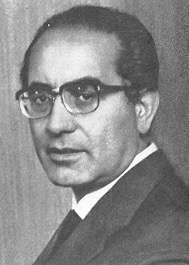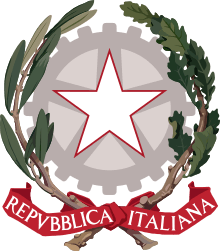Emilio Colombo
Emilio Colombo (11 April 1920 – 24 June 2013)[1] was an Italian politician and the Prime Minister of Italy from 1970 to 1972. In addition to having held top positions in Italian governments, he was also the president of the European Parliament. In 2003 he was appointed to be an Italian senator for life, a seat which he held until his death. In the first five years as senator, he was an independent. From 2008 until his death in June 2013, Colombo was a member of the Autonomies group, formed mainly by elects in Trentino-Alto Adige/Südtirol.
Emilio Colombo | |||||||||||||||||||||||||||||||||
|---|---|---|---|---|---|---|---|---|---|---|---|---|---|---|---|---|---|---|---|---|---|---|---|---|---|---|---|---|---|---|---|---|---|
 | |||||||||||||||||||||||||||||||||
| 40th Prime Minister of Italy | |||||||||||||||||||||||||||||||||
| In office 6 August 1970 – 17 February 1972 | |||||||||||||||||||||||||||||||||
| President | Giuseppe Saragat Giovanni Leone | ||||||||||||||||||||||||||||||||
| Preceded by | Mariano Rumor | ||||||||||||||||||||||||||||||||
| Succeeded by | Giulio Andreotti | ||||||||||||||||||||||||||||||||
| President of the European Parliament | |||||||||||||||||||||||||||||||||
| In office 8 March 1977 – 17 July 1979 | |||||||||||||||||||||||||||||||||
| Preceded by | Georges Spénale | ||||||||||||||||||||||||||||||||
| Succeeded by | Simone Veil | ||||||||||||||||||||||||||||||||
| Minister of Foreign Affairs | |||||||||||||||||||||||||||||||||
| In office 1 August 1992 – 28 April 1993 | |||||||||||||||||||||||||||||||||
| Prime Minister | Giuliano Amato | ||||||||||||||||||||||||||||||||
| Preceded by | Vincenzo Scotti | ||||||||||||||||||||||||||||||||
| Succeeded by | Beniamino Andreatta | ||||||||||||||||||||||||||||||||
| In office 4 April 1980 – 4 August 1983 | |||||||||||||||||||||||||||||||||
| Prime Minister | Arnaldo Forlani Giovanni Spadolini Amintore Fanfani | ||||||||||||||||||||||||||||||||
| Preceded by | Attilio Ruffini | ||||||||||||||||||||||||||||||||
| Succeeded by | Giulio Andreotti | ||||||||||||||||||||||||||||||||
| Minister of Finance | |||||||||||||||||||||||||||||||||
| In office 13 April 1988 – 22 July 1989 | |||||||||||||||||||||||||||||||||
| Prime Minister | Ciriaco De Mita | ||||||||||||||||||||||||||||||||
| Preceded by | Antonio Gava | ||||||||||||||||||||||||||||||||
| Succeeded by | Rino Formica | ||||||||||||||||||||||||||||||||
| Minister of Budget | |||||||||||||||||||||||||||||||||
| In office 29 July 1987 – 13 April 1988 | |||||||||||||||||||||||||||||||||
| Prime Minister | Giovanni Goria | ||||||||||||||||||||||||||||||||
| Preceded by | Giovanni Goria | ||||||||||||||||||||||||||||||||
| Succeeded by | Amintore Fanfani | ||||||||||||||||||||||||||||||||
| In office 25 June 1968 – 13 December 1968 | |||||||||||||||||||||||||||||||||
| Prime Minister | Giovanni Leone | ||||||||||||||||||||||||||||||||
| Preceded by | Giovanni Pieraccini | ||||||||||||||||||||||||||||||||
| Succeeded by | Luigi Preti | ||||||||||||||||||||||||||||||||
| Minister of Treasury | |||||||||||||||||||||||||||||||||
| In office 15 March 1974 – 30 July 1976 | |||||||||||||||||||||||||||||||||
| Prime Minister | Mariano Rumor Aldo Moro | ||||||||||||||||||||||||||||||||
| Preceded by | Ugo La Malfa | ||||||||||||||||||||||||||||||||
| Succeeded by | Gaetano Stammati | ||||||||||||||||||||||||||||||||
| In office 18 February 1972 – 26 June 1972 | |||||||||||||||||||||||||||||||||
| Prime Minister | Giulio Andreotti | ||||||||||||||||||||||||||||||||
| Preceded by | Mario Ferrari Aggradi | ||||||||||||||||||||||||||||||||
| Succeeded by | Giovanni Malagodi | ||||||||||||||||||||||||||||||||
| In office 22 June 1963 – 6 August 1970 | |||||||||||||||||||||||||||||||||
| Prime Minister | Giovanni Leone Aldo Moro Mariano Rumor | ||||||||||||||||||||||||||||||||
| Preceded by | Roberto Tremelloni | ||||||||||||||||||||||||||||||||
| Succeeded by | Mario Ferrari Aggradi | ||||||||||||||||||||||||||||||||
| Minister of Grace and Justice | |||||||||||||||||||||||||||||||||
| In office 6 August 1970 – 17 February 1972 | |||||||||||||||||||||||||||||||||
| Prime Minister | Himself | ||||||||||||||||||||||||||||||||
| Preceded by | Oronzo Reale | ||||||||||||||||||||||||||||||||
| Succeeded by | Guido Gonella | ||||||||||||||||||||||||||||||||
| Minister of Foreign Trade | |||||||||||||||||||||||||||||||||
| In office 2 July 1958 – 16 February 1959 | |||||||||||||||||||||||||||||||||
| Prime Minister | Amintore Fanfani | ||||||||||||||||||||||||||||||||
| Preceded by | Guido Carli | ||||||||||||||||||||||||||||||||
| Succeeded by | Rinaldo Del Bo | ||||||||||||||||||||||||||||||||
| Minister of Agriculture | |||||||||||||||||||||||||||||||||
| In office 6 July 1955 – 2 July 1958 | |||||||||||||||||||||||||||||||||
| Prime Minister | Antonio Segni Adone Zoli | ||||||||||||||||||||||||||||||||
| Preceded by | Giuseppe Medici | ||||||||||||||||||||||||||||||||
| Succeeded by | Mario Ferrari Aggradi | ||||||||||||||||||||||||||||||||
| Mayor of Potenza | |||||||||||||||||||||||||||||||||
| In office 14 June 1952 – 14 January 1955 | |||||||||||||||||||||||||||||||||
| Preceded by | Pietro Scognamiglio | ||||||||||||||||||||||||||||||||
| Succeeded by | Vincenzo Solimena | ||||||||||||||||||||||||||||||||
| |||||||||||||||||||||||||||||||||
| Personal details | |||||||||||||||||||||||||||||||||
| Born | 11 April 1920 Potenza, Basilicata, Kingdom of Italy | ||||||||||||||||||||||||||||||||
| Died | 24 June 2013 (aged 93) Rome, Lazio, Italy | ||||||||||||||||||||||||||||||||
| Political party | Christian Democracy | ||||||||||||||||||||||||||||||||
Early life and education
Colombo was born in Potenza, Basilicata on 11 April 1920.[2] He held a law degree.[3]
Career

Colombo entered politics as a member of the Christian Democracy in 1948.[4][5] He was firstly elected to the parliament in 1948.[6] Having held several cabinet posts, he served as the prime minister of Italy from 1970 until his resignation in 1972.[4]
A number of progressive reforms were introduced during Colombo's time as prime minister. A housing reform law of 22 October 1971 introduced new criteria for land expropriations and provisions for urban renewals. Under a law of 6 December 1971, state funds were made available for the construction of a kindergarten in every local authority. A law of 30 December 1971 introduced new regulations covering protection of female workers and maternity insurance. The duration of maternity leave was extended two months prior to, and two months after confinement for all employees, and all female workers were entitled to an earnings-related indemnity, equal to 80% of earnings (including agricultural workers and tenant farmers). Also introduced was an entitlement to voluntary extra period of leave for six months during the first year of the child’s life, with job security and an indemnity equal to 30% of earnings, together with an entitlement to paid absences due to the child’s sickness during the first three years if the child’s life. In addition, a special natality allowance was introduced for self-employed women in the agricultural, artisan, and commercial sectors.[7]
Later he became president of the European Parliament (occupying that office from 1977 until 1979) and foreign minister of Italy (from 1980 until 1983, and again from 1992 until 1993).[4] In February 2003 then president Carlo Azeglio Ciampi bestowed Italy's highest political honour on him, by nominating him Senator for life.[4]
After the inconclusive elections on 24–25 February 2013 and the following difficulties of the hung Senate in electing a presiding officer, Colombo became acting speaker of the Senate, being the most senior member, until the election of Pietro Grasso on 16 March 2013.
After the death of Giulio Andreotti on 6 May 2013, Colombo became the last surviving member of the Italian Constituent Assembly.[4]
Personal life
In November 2003, he admitted to have used cocaine (for "therapeutic purposes") over a 12- to 18-month period.[8][9]
Colombo died in Rome on 24 June 2013 at the age of 93.[6][10]
Honours and awards
- Gold Medal of the Jean Monnet Foundation for Europe, in 2011.
References
- Profile of Emilio Colombo
- Page at Senate website (in Italian)
- "Emilio Colombo". Ministry of Foreign Affairs. Retrieved 22 April 2013.
- "Senator-for-life, framer of Italian Constitution, dies at 94". La Gazzetta del Mezzogiorno. Rome. ANSA. 25 June 2013. Retrieved 26 June 2013.
- "Former Italian prime minister Emilio Colombo dead at 93". NewsDaily. 25 June 2013. Retrieved 26 June 2013.
- "Former Italian prime minister Emilio Colombo dead at 93". Reuters. 25 June 2013. Retrieved 26 June 2013.
- Growth to Limits: The Western European Welfare States Since World War II Volume 4 edited by Peter Flora
- Scalfari, Eugenio (27 February 2007). "Casini dica Dico". L'Espresso (in Italian). Archived from the original on 16 June 2010. Retrieved 20 July 2007.
- Hooper, John (27 November 2003). "Former PM tells of regular cocaine use". The Age. Melbourne. Retrieved 20 July 2007.
- "È morto Emilio Colombo: aveva 93 anni L'Italia dice addio all'ultimo padre costituente". la Repubblica (in Italian). 24 June 2013. Retrieved 24 June 2013.
| Political offices | ||
|---|---|---|
| Preceded by Pietro Scognamiglio |
Mayor of Potenza 1952–1955 |
Succeeded by Vincenzo Solimena |
| Preceded by Giuseppe Medici |
Italian Minister of Agriculture 1955–1958 |
Succeeded by Mario Ferrari Aggradi |
| Preceded by Guido Carli |
Italian Minister of Foreign Trade 1958–1959 |
Succeeded by Rinaldo Del Bo |
| Preceded by Giorgio Bo |
Italian Minister of Industry 1959–1963 |
Succeeded by Giuseppe Togni |
| Preceded by Roberto Tremelloni |
Italian Minister of Treasury 1963–1970 |
Succeeded by Mario Ferrari Aggradi |
| Preceded by Giovanni Pieraccini |
Italian Minister of Budget 1968–1968 |
Succeeded by Luigi Preti |
| Preceded by Mariano Rumor |
Prime Minister of Italy 1970–1972 |
Succeeded by Giulio Andreotti |
| Preceded by Oronzo Reale |
Italian Minister of Justice 1971–1972 |
Succeeded by Guido Gonella |
| Preceded by Mario Ferrari Aggradi |
Italian Minister of Treasury 1972–1972 |
Succeeded by Giovanni Francesco Malagodi |
| Preceded by Title jointly held |
Italian Minister without portfolio 1972–1973 |
Succeeded by Title jointly held |
| Preceded by Athos Valsecchi |
Italian Minister of Finance 1973–1974 |
Succeeded by Mario Tanassi |
| Preceded by Ugo La Malfa |
Italian Minister of Treasury 1974–1976 |
Succeeded by Gaetano Stammati |
| Preceded by Georges Spénale |
President of the European Parliament 1977–1979 |
Succeeded by Simone Veil |
| Preceded by Attilio Ruffini |
Italian Minister of Foreign Affairs 1980–1983 |
Succeeded by Giulio Andreotti |
| Preceded by Giovanni Goria |
Italian Minister of Budget 1987–1988 |
Succeeded by Amintore Fanfani |
| Preceded by Antonio Gava |
Italian Minister of Finance 1988–1989 |
Succeeded by Rino Formica |
| Preceded by Vincenzo Scotti |
Italian Minister of Foreign Affairs 1992–1993 |
Succeeded by Beniamino Andreatta |
| Italian Chamber of Deputies | ||
| Preceded by None, Parliament re-established |
Member of Parliament for Basilicata Legislatures: CA, I, II, III, IV, V, VI, VII, VIII, IX, X, XI 1946 – 1992 |
Succeeded by Title jointly held |
| Assembly seats | ||
| Preceded by Parliament established |
Member of European Parliament for Southern Italy Legislatures: I, III 1979 – 1980 1989 – 1992 |
Succeeded by Title jointly held |
| Italian Senate | ||
| Preceded by Title jointly held |
Lifetime Italian Senator Legislatures: XIV, XV, XVI 2003 – 2013 |
Succeeded by Title jointly held |
.svg.png)

